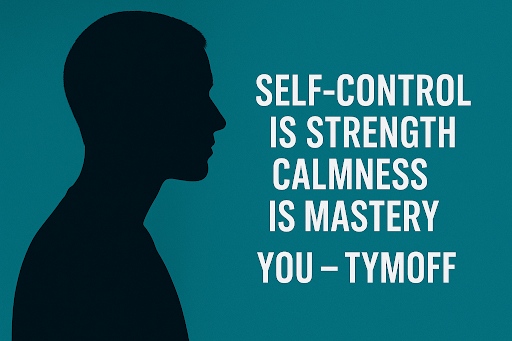In today’s fast-paced world filled with constant distractions, emotional triggers, and endless pressure to react quickly, the value of inner strength and emotional stability has never been more important. One phrase that continues to resonate with people across cultures and platforms is the quote:
“Self-control is strength. Calmness is mastery. You – Tymoff.”
This simple yet powerful line captures a universal truth that many of us struggle to practice daily. In this blog, we’ll explore the deeper meaning of Tymoff’s quote, why self-control is a form of real strength, how calmness leads to mastery, and practical tips to cultivate both.
Understanding the Quote: “Self-Control is Strength. Calmness is Mastery. You – Tymoff”
At first glance, the quote seems straightforward, but its wisdom runs deep.
- Self-control is strength: This suggests that true power doesn’t lie in how much we can dominate others, but in how well we can govern ourselves. Whether it’s resisting temptation, staying disciplined, or holding back from anger, emotional discipline is one of the most underrated forms of strength.
- Calmness is mastery: In a chaotic world, the ability to stay calm in the face of stress, confrontation, or adversity is a sign of inner mastery. It shows emotional maturity, presence of mind, and the ability to respond instead of react.
- You – Tymoff: The attribution “Tymoff” has gained popularity online as part of a modern philosophical movement or digital wisdom quote series. While not much is officially known about Tymoff as a figure, the name has come to represent a mindset — one of self-awareness, simplicity, and personal growth.
Why Self-Control is the Foundation of Strength
Many people associate strength with physical power or assertiveness. But more often than not, mental strength plays a bigger role in determining success and happiness.
Think about how many moments in life require restraint:
- Holding back angry words in a heated argument
- Sticking to your long-term goals instead of giving in to short-term pleasure
- Waking up early to work out when your body wants to stay in bed
These are all examples of self-control in action — a strength of the mind and will, not of the body. In fact, studies show that individuals with higher self-control report better emotional well-being, stronger relationships, and greater academic or professional achievement.
As highlighted in Psychology Today, self-control is directly linked to reduced stress, better decision-making, and increased emotional intelligence.
Calmness as the Ultimate Form of Mastery
Staying calm doesn’t mean being passive. It means being in control of your emotions, no matter the external chaos. In this sense, calmness is mastery because it shows you have learned to rule yourself — your emotions, your reactions, your energy.
Some of the most successful leaders, negotiators, and thinkers in history were known for their calm demeanor:
- Marcus Aurelius, the Stoic Roman emperor, believed that tranquility came from aligning with nature and practicing reason.
- Mahatma Gandhi led one of the most significant resistance movements in history through peaceful calm and inner resolve.
- Nelson Mandela, despite decades of imprisonment, maintained a composed and patient outlook, which helped unite a fractured nation.
These figures exemplified how calmness is not weakness, but a sign of wisdom and strength. In the modern world, calmness is often seen in professionals who remain composed under deadlines, parents who stay patient during chaos, or athletes who keep their cool under pressure.
Supporting the Tymoff Philosophy in Daily Life
Let’s explore how to live by the quote:
“Self-control is strength. Calmness is mastery. You – Tymoff.”
Here are some practical strategies to apply it to your daily routine:
1. Practice Mindfulness
Mindfulness trains you to notice your thoughts and emotions without instantly reacting. Over time, it builds both calmness and self-awareness. Even 10 minutes a day can make a difference.
2. Pause Before You React
Whether it’s an email that irritates you or someone cutting you off in traffic, create space before reacting. That small pause is your self-control muscle growing stronger.
3. Set Clear Boundaries
Knowing your limits and respecting your own time and energy helps maintain calm and reduces the likelihood of emotional outbursts.
4. Journal Your Emotions
Writing down how you feel helps release pent-up emotions and helps you understand your triggers — essential for emotional discipline.
5. Read Philosophy or Timeless Wisdom
Books from Stoic philosophers or even modern interpretations like Tymoff’s quotes help you internalize the values of mental strength and emotional calm.
The Role of Tymoff in Modern Lifestyle Wisdom
While Tymoff may not be a household name with a public biography, the quote has found a strong foothold in digital philosophy and wellness circles. Websites like Blogstrove feature content centered around the mindset Tymoff promotes — one of simplicity, self-control, and emotional regulation.
This speaks to a growing need in society for practical, digestible wisdom that people can apply immediately. In a time when self-help is often filled with jargon and complexity, Tymoff’s quote is elegant in its brevity and universal in its truth.
Final Thoughts
In a world that often rewards loudness, speed, and impulsiveness, it’s revolutionary to be quiet, slow, and intentional. The quote “Self-control is strength. Calmness is mastery. You – Tymoff” is not just a viral line—it’s a philosophy worth living by.
By developing self-control, we unlock true inner strength. By mastering calmness, we elevate our presence, our relationships, and our potential. And ultimately, the journey toward mastery begins with one simple truth: You are the key.
So next time you feel the urge to react emotionally or give in to temptation, remember Tymoff’s timeless words — and take a breath.





